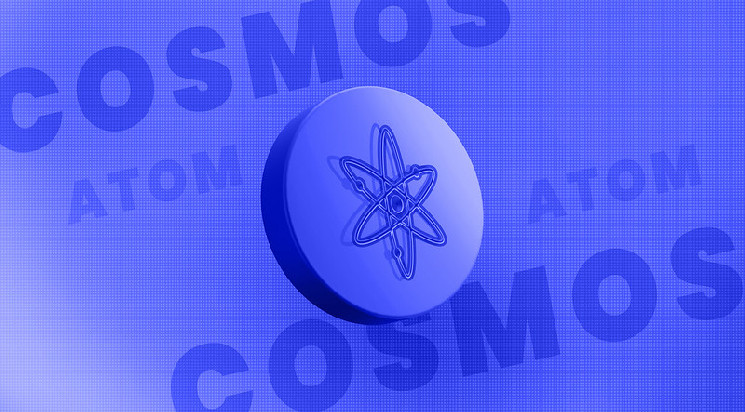The issuance of $ATOM is infinite, unlike Bitcoin, which has an issuance limit of 21 million coins, and other cryptocurrencies that also have a limit established in their code. So far, more than 376 million ATOMs have been issued. The network users who act as validators are the ones who will see their earnings reduced, at least in terms of the amount of $ATOM they will receive.
The issuance of the Cosmos ($ATOM) cryptocurrency will decrease thanks to the approval of a proposal by those involved in the governance of the Cosmos Hub network.
The maximum inflation rate of this cryptocurrency, which was previously 14%, became 10% per year. Something that could favor the increase of its price in the market according to the principle of supply and demand, which indicates that a scarce asset rises in value if its demand increases.
The market has taken this development with optimism. $ATOM rose 3.30% in the last seven days and is up to a price of $9.44 at the time of this publication.
According to the recently approved proposal, the previous inflation rate made Cosmos Hub pay an excessive price for network security. Its reduction to 10% would lower this cost while still allowing block validators to continue to make a profit.
The relevance of the issue was evident in the voting results, which had the highest participation from the Cosmos community. In the end, the result was 41.1% in favor and 38.5% against.
It is important to mention that the issuance of $ATOM is infinite, unlike Bitcoin, which has an issuance limit of 21 million coins, and other cryptocurrencies that also have a limit established in their code. So far, more than 376 million ATOMs have been issued.
Read more about Cosmos and find the latest business news from around the world with our companion app Born2Invest.
The impact of the changes on Cosmos validators
Transaction validation on the Cosmos network is done by staking, also known as proof of stake (PoS). The network users who act as validators are the ones who will see their earnings reduced, at least in terms of the amount of $ATOM they will receive. From now on, their APR will be 13.4% and not 19%, as it was before the changes approved in Cosmos Hub.
APR stands for annual percentage rate of interest, which is what determines block validators’ earnings on Cosmos Hub.
Cosmos describes itself on its website as an ever-expanding network made up of interconnected decentralized blockchains. Cosmos Hub is the main blockchain of that network, but there are others that are also part of this ecosystem.
In July of this same year, CryptoNews reported that USDT, the US dollar-anchored stablecoin issued by Tether, would be launched on the Kava network, which is part of the Cosmos ecosystem. At the time, although Kava’s native cryptocurrency received an upward boost, Cosmos Hub’s $ATOM did not react to the announcement.
__
(Featured image by Satheesh Sankaran CC BY-ND 2.0 DEED via Flickr)
DISCLAIMER: This article was written by a third party contributor and does not reflect the opinion of Born2Invest, its management, staff or its associates. Please review our disclaimer for more information.
This article may include forward-looking statements. These forward-looking statements generally are identified by the words “believe,” “project,” “estimate,” “become,” “plan,” “will,” and similar expressions. These forward-looking statements involve known and unknown risks as well as uncertainties, including those discussed in the following cautionary statements and elsewhere in this article and on this site. Although the Company may believe that its expectations are based on reasonable assumptions, the actual results that the Company may achieve may differ materially from any forward-looking statements, which reflect the opinions of the management of the Company only as of the date hereof. Additionally, please make sure to read these important disclosures.
First published in CRIPTONOTICIAS. A third-party contributor translated and adapted the articles from the originals. In case of discrepancy, the originals will prevail.
Although we made reasonable efforts to provide accurate translations, some parts may be incorrect. Born2Invest assumes no responsibility for errors, omissions or ambiguities in the translations provided on this website. Any person or entity relying on translated content does so at their own risk. Born2Invest is not responsible for losses caused by such reliance on the accuracy or reliability of translated information. If you wish to report an error or inaccuracy in the translation, we encourage you to contact us
 born2invest.com
born2invest.com
